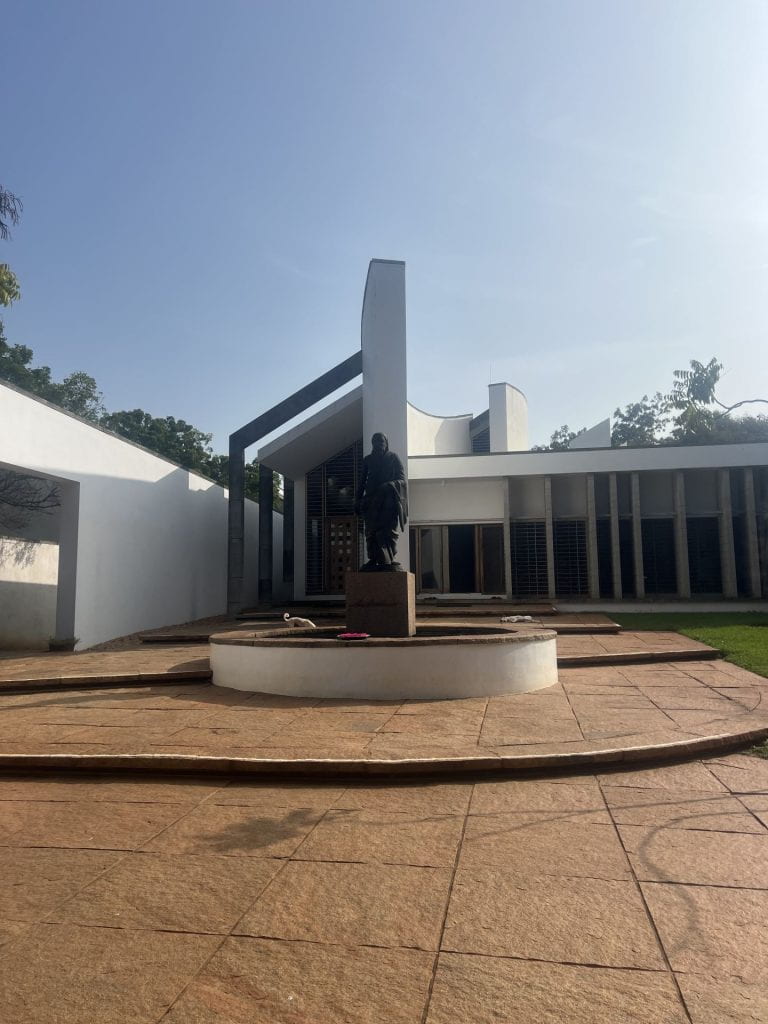The Reimagining India tour began with Auroville. This illuminating experience introduced us to an intentional community far outside of New Zealand norms. It’s through experiences we find the most uncomfortable that we encounter the deepest insights and this visit stands emblematic of this truism.
One noble lie sealing the lips of truth as we pave the way to utopia,
If only everyone followed mother design,
This isn’t a religion.
One social experiment after another, paving the path to utopia with fecal standard currency? (Mehrotra, 2021)
If only the government didn’t meddle,
It’s not religious without intentionality.
Are we there yet…?
One too many commitment issues to the experiment and what happens to the children of utopia?
People will realise their true nature,
We don’t seek to remove your faith; you will realise its subordination.
One lie, two lies, three lies,
Four, I have never questioned the mother’s design,
Is this the human nature we mean?
My poetry seeks to convey the unintended consequences of well-meaning intentions expressed in a community such as Auroville. Founded in 1968, Mirra Alfassa the architect of Auroville idolised herself into the community’s vision as “the Mother”. The settlement seeks to embody the peace, unity and harmony practised by Sri Aurobindo conceptualised as a return to nature. The idea of human nature is what drives my aversion to Auroville. Humans are conveyed in a Jean-Jacques Rousseau state of nature where “Man is born free but everywhere is in chains.”(Rousseau, 1762) Paraphrased in Aurovillian terms, society is resonating on the wrong frequency, is out of touch with the environment and our nature, a valid criticism I will return to. However, this thinking has motivated throwing the baby out with the bath water and attempting to conceive society out of history, from abstract into existence.
We do not need hierarchy or institutions, we can liberate ourselves from the shackles of tradition with reason: Sapere aude “dare to know” as the enlightenment pronounces (Kant, 1784).
What this philosophy misses is that the shackles that society puts on man through institutions and hierarchies have developed over time in response to his nature. Man is good but has a propensity for evil and when placed in a boundless community the latter prevails. In Auroville, this is illustrated by the many lies the citizens tell themselves as they march towards “perfection”. My poem references these lies: scapegoating members not following the mother’s teachings, scapegoating the government, problems with committing to social experiments, charges that the community is exclusive to the “right type of person”, and allegations of child abuse.
Is it possible that Auroville’s problem is this conception of human nature? This is a question that many Aurovillians can’t answer because they do not question the mother’s design. This is what marks Auroville as a cult. People of faith all around the world trust in the supernaturalist qualities of their faith doctrines and thus have an awareness of the role of reason and the supernatural. In a cult, this and many realities are denied because of the lies bound in an unquestionable dream.
Can anything be reconciled from this experiment? A reaffirmed commitment to institutions that are true to the good and bad of human nature, that are inclusive of all people and crucially keep the vulnerable safe. This is not to romanticise the West. What Auroville does add to the dialectic, at great cost, is a critique of what the world has lost in globalisation and ways of reintegrating this knowledge into tried and true society. While at Auroville, we visited the Solitude Sustainable Farm that reinvigorates growing local foods, dispelling Adam Smith’s theory of a Wealth of Nations that globalised open markets are good for all (Smith, 1776). Growing local, Krishna our guide explains, is more affordable and nutritious for local people as it is grown with the seasons and requires less transport and chemicals: an initiative the Indian government are exploring. A further insight of the Aurovillian antithesis is the synthesis found in the village’s Sound Bar which enlivens healing frequencies used in many instruments lost to globalisation. Penultimately, the crowning Jewel of the dialectic is Hyde, a bag and furniture manufacturer owned by an escaped Aurovillian. The company successfully harmonises the safety and inclusivity of today’s institutions with Auroville’s cultural renaissance. At Hyde, all scrap is used to make shopping bags, factories are 70% solar run, workers get paid additional percentage of material saved and local women are employed in an area with a lack of employment locally and where the is norm is male work. Ultimately, Auroville was a thought-provoking experience that reaffirmed the importance of well-adjusted, inclusive and safe institutions while offering a lens to build upon tried and true society.
References
Adam, Smith. An Inquiry into the Nature and Causes of the Wealth of Nations. University of Chicago Press, 1776.
Immanuel Kant, ‘Beantwortung der Frage: Was ist Aufklärung?’, Berlinische Monatsschrift, XII, 1784, pp. 481-494.
Jean-Jacques, Rousseau. “The Social Contract.” Book I, Chapter 1, 1762.
Karishma Mehrotra “In quest for utopia, Auroville hopes that it can create a society without money using an app” 2021. Scroll.in. https://amp.scroll.in/magazine/1000752/in-quest-for-utopia-auroville-adopts-app-that-it-hopes-will-lead-to-a-society-without-money









Quite an interesting reflection. Although my question is, it isn’t this the same with the liberal cultural hegemony? If we look at internationally, is the western model that sustainable? Isn’t liberalism making the same mistake with human nature? For that I recommend you cheek out the philosopher Leo Strauss. Another one is the philsophize This episode on ‘The Consequence of Reason”
It’s funny how we forget our own critiques on liberalism after WWII and after its triumph